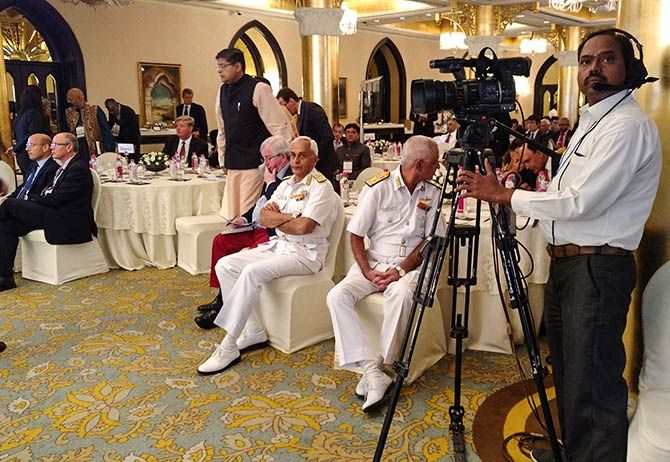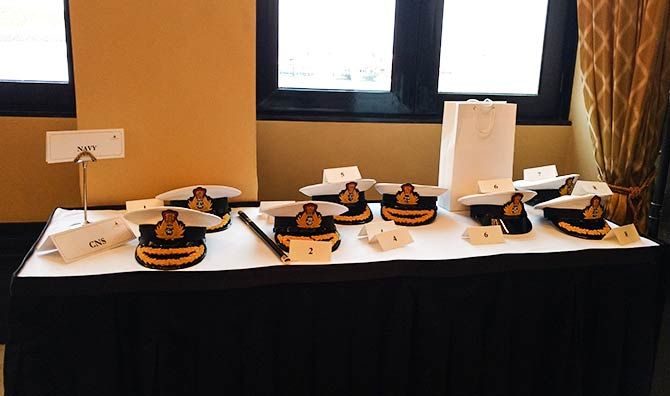 | « Back to article | Print this article |
Asserting that "maritime muscle flexing" by some countries and other factors have made the Indo-Pacific region "more contested and more volatile," naval chief Admiral Sunil Lanba on Tuesday said the engagement of the Indian Navy in these oceans was symbolic of India's dream for this region.

Speaking on 'Indo-Pacific: Possibilities and Portents' in a conference organised in Mumbai by the Gateway House and the ministry of external affairs, Admiral Sunil Lanba, chief of naval staff said: "The region is witnessing a global power shift from the west to the east. The US rebalancing a rising China. The emergence of traditional and non-traditional maritime security challenges. This maritime region has always been of immediate relevance to the resident stake-holder, but has now gained greater eminence during an era of major global churn. The Indo-Pacific is thus certainly passing through interesting times."
Lanba started out by first explaining and highlighting the importance of the region: "The interplay between politics, economics and technology as the principal drivers for getting value out of resources has been highlighted.... My intent is providing a geo-strategic backdrop to the whole context of geo-economics, with security being the central theme. The topic of Indo-Pacific possibilities has special significance as a regional dynamic of this notional space has come to bear great significance for international geopolitics and economic well-being of the entire world.
"As the name suggests, the term Indo-Pacific broadly symbolises the area comprising two great oceans -- Indian Ocean and Pacific Ocean. The term is still evolving and is increasingly being accepted as a concept in the strategic discourse.
"The geographic extent of this terminology could have multiple interpretations. But in the contemporary world the notion essentially brings the Indian Ocean and the western part of the Pacific into one strategic arc.
"Some analysts would have us believe that 21st century is the century belonging to Asia. It is generally acknowledged that the geopolitical, the geo-economic and particularly the geostrategic focus is in the process of shifting to the shores of the Indian and Pacific Ocean. And more precisely to the Indo-Pacific region. The existing nebulous regional environment in the Indo-Pacific is also marked by several (rival) powers who are pursuing for greater space on the global stage."
Citing statistics, the navy chief said, the region is "home to more than 60 per cent of the world's population. The world's leading and rising economic giants powered by demography and technology, the region has emerged."
He added that the Indo-Pacific is a centre of global manufacturing and service industry. And that it also had the world's most important trade routes. "The importance of the Indo-Pacific sealink for global trade cannot be overstated… The area accounts for about 60 per cent of the world's global exports and imports in volumes... It may be safely asserted that Indo-Pacific is the fastest growing economic region of the world."
Lanba cautioned, "Even though the possibilities of the Indo-Pacific region are exciting from the economic perspective, the portents are clearly discernible from a maritime security perspective."

The navy chief said the region is confronted with both traditional and non-traditional maritime security challenges. "As regard to traditional maritime challenges, one observes sovereignty issues, territorial disputes, contradicting positions on international norms are defining national interactions in the region.”
This has “led to an escalation of maritime muscle flexing by various countries in the region. This resurgent maritime dynamic in the wider context has been termed, in some quarters, as historically unprecedented and hitherto unseen. You can observe that regional military modernisation decisions are being driven by action-reaction dynamics. Force levels by one country have become contingent upon the known, assumed and anticipated capabilities of other countries. This has indeed made the Indo-Pacific region more contested and potentially more volatile.
"What is interesting to note however is that nations with vastly differing international views and divergent national interests are at the same time significant trade partners and are economically well connected. There is a tremendous balance where nations of the region committed on one hand to the pursuit of economic growth are also displaying a concurrent desire to bolster the capabilities of their armed forces. This current pursuit of growth and defence has given rise to an interesting situation in international relationships."
Since the players of the Indo-Pacific region are not always alike in their aspirations, the States of the region therefore cooperate with one set of countries for economic gains and are dependent on another set of countries for security-related issues, he said.
"Quite naturally the contradictions are also emerging within this narrative... Organisations, both international and regional, created for enabling cooperation among countries of the region, are being undermined with unilateral policy pronouncements and display of economic hegemony by some countries. In addition, maritime economic arteries passing through the region are increasingly becoming vulnerable to non traditional threats."
Lanba said though piracy had been contained, in 2016 there had been reports of five incidents of piracy and 80 armed robberies in the region. Most of these attacks were claimed by terrorist groups based in the Philippines. "These are indicative of trends where distinctions between traditional piracy and maritime terrorism is fading rapidly." Coordinated patrolling and enhanced surveillance has helped the situation although the region is still vulnerable to these "asymmetrical threats."
He added, "Any disruption of oil or trade flow in the region will have a detrimental impact on the regional as well as global economy. Therefore it becomes essential that peace and security prevails in this region."
Increasing urbanisation, higher population density, climate change, pollution and illegal fishing pose threats to the region and its ecosystem and cause tension and insecurity. The Indo-Pacific region is prone to natural disasters that brought in their wake human suffering, while affecting and destroying the "economic capabilities and infrastructure in these countries.''
Lanba quoted figures from an Asian Development Bank study that said the cost of damages, from climate disaster in the region between 2010 and 2015, had amounted to in excess of 335 billion dollars.
The navy chief drew attention to the fact that the Indo-Pacific region is also exposed to a mix of other criminal activities like human trafficking, arms trade and drugs, in addition to geopolitical tensions.
"Despite the numerous maritime challenges, the Indo-Pacific region underpins the Asian growth story. And we in India today have a major stake in this region."
The navy chief said India is charting its course of economic growth using a civilisational ethos of realism, co-existence, cooperation and partnership. In achieving this role, the navy will continue to be 'net security provider' in the Indian Ocean region.
To achieve these goals, the navy has taken a number of initiatives such as humanitarian assistance, disaster relief operations (for example, Operation Raahat where the Indian Navy rescued Indian and citizens of 47 other countries after civil war broke out in Yemen), anti-piracy missions, Indian Ocean naval symposium and resource-sharing with other navies, Lanba maintained.
He hoped the Indo-Pacific emerges as a "region of opportunities" and assured the audience the navy will do its utmost to play its role as India's maritime power. He said in his opinion all the engagements (like those listed above) of the Indian Navy are "symbolic" of India's dream for this region.
The admiral explained that "lack of trust and differing ultra nationalist perceptions" can cause tensions in the region. But the "silver lining" was, he said, that an analysis of what had happened in many instances in the past showed that the countries in the region have managed to "find a way around the contradictions" and continued to do business with each other.
The most effective way to overcome the "existing trust deficit" that exists between the states of the Indo-Pacific was to "enhance the level of engagement and interactions with each other," he felt.
"In spite of the centrality of the ocean to all countries in the region, maritime governance structures and a combined approach towards resources, resolving maritime threats and challenges have not been accorded the deserved prominence." He said he strongly believes that the "full potential towards fostering a positive and cooperative environment has not yet been fully realised" in the Indo-Pacific region.
Regional organisations, that can bring about better cooperation between countries of the region, through a variety of exercises like operational exchange, information sharing and many more, needed to empowered.
That he said, would help ensure that "nations of the region can act as capable and adaptive partners rather than argumentative, tense competitors." That would inculcate a sense of collective responsibility and ownership.
He said no one knew it better than the countries in the region that "Confrontation would be only bring disaster and distress." It would crush the dreams of economic empowerment for the masses of people in this region. India being so centrally located in the Indo-Pacific made her role even more key.
Lanba told the audience he would leave them with some "food for thought." The goal of the human race is to strive for "betterment." The term betterment is itself comparative. Comparison leads to competition.
"Competition leads to conflict. We have learned from history that conflict defeats the very purpose of betterment... One of the ways to avoid conflict is to make "all stakeholders (in this region) equitable partners in the development process" and basing interactions on mutual respect is very important. His wish he said was to see that the Indo-Pacific region becomes a region of equal opportunity.